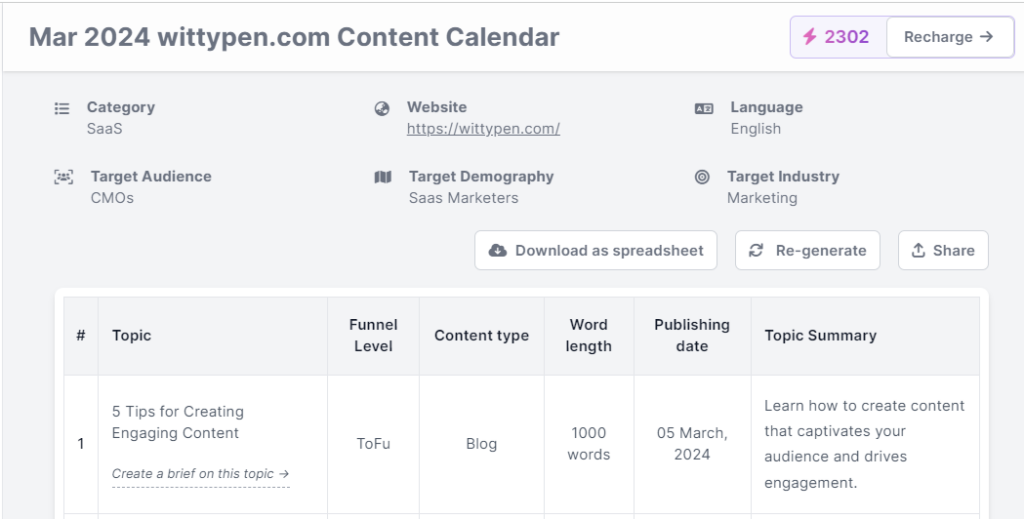Last updated on February 26th, 2024
Do you find it challenging to publish fresh, informative, and attention-grabbing blogs on a regular basis?
Blogs are an essential aspect of any business’s marketing strategy in 2024. They offer a host of different benefits, such as increasing website traffic, building trust in the brand along with thought leadership, increasing brand awareness, and generating leads, among others.
However, writing and publishing them regularly can be a challenge, and the back end of this (keyword research, topical research, and so on) can be rather time-consuming, especially without a definitive and organised approach.
If you’re finding it tricky to routinely research and write high-quality blogs, you’ve come to the right place. We introduce you to the idea of a blog content calendar and show you how it can help streamline your marketing efforts.
The Role of a Content Calendar in Marketing
The first thing to understand before we dive into creating a blog calendar is how content calendars are critical to marketing.
A content calendar helps businesses plan and organise their content marketing efforts effectively and offers a host of different benefits. Some of these benefits include:
- Effective Planning: It helps businesses strategically plan their marketing efforts with a specific goal in mind (such as generating leaders, building thought leadership, etc.).
- Consistency in Production: It ensures the consistent production and publishing of blogs on your brand’s website, thereby giving it a higher chance of gaining its audiences’ loyalty.
- Content Management: It helps brands manage a variety of different forms of content that they use to market themselves (blogs, social media copy, email campaigns, etc.).
A content calendar thus offers marketers a range of benefits. However, it’s not just marketers that could benefit from it.
In the next section, we discuss who can benefit from using a blog content calendar.
Who Needs a Blog Content Calendar?

Wittypen Content Calendar Generator’s Output source
While a blog content calendar is crucial, who can primarily benefit from it? A blog content calendar can be helpful for both individuals and organisations alike. It’s ideal for anyone who wants to leverage content marketing to build a larger audience and generate leads.
1. Marketing Teams
The first group that can most certainly benefit from a blog content calendar is a business’s marketing team.
Since brands aim to consistently publish blogs on the website to increase visibility and generate leads, a blog content calendar can help them streamline the research, production, publication, and organisation of their blogs.
What’s more, it also helps align the various members of their marketing teams to ensure there’s no overlapping of work or duplicated efforts.
2. Content Creators
While a lot of content creators today primarily use social media platforms like Instagram and YouTube, many still have a website of their own and routinely publish blogs.
Content creators who tend to work alone often produce a variety of content, and a comprehensive content calendar can help them streamline and plan their content production process.
3. Content Agencies
Content agencies typically tend to work with multiple clients at a time, and handling an endless list of content requirements can be a challenge. A blog content calendar can thus help agencies ensure the timely delivery of blogs to each client, thereby strengthening their reputation.
How to Build an Effective Blog Content Calendar?
With the key beneficiaries of a blog content calendar out of the way, how can you build a comprehensive blog content planner? Let’s take a look at the six key steps involved in this process.
Step 1: Create a blog Content Calendar Template
The first step is to create a comprehensive blog content calendar template. While you can use a variety of content management tools and apps available online, these can be expensive, especially for creators and bootstrapped startups.
A readily available blog content planner template can thus be the ideal solution to add, track, and analyse all the effort you put into your website’s blog. Wittypen also offers a unique Content Calendar Generator that can help you generate, organise, and schedule all your content across a range of different marketing channels.

Step 2: Conduct Keyword Research
The next step is to perform keyword research for all your blogs. Keyword research in itself can be an extensive process and requires a lot of technical know-how.
While a lot of businesses tend to use the first keywords they find that seem relevant, this approach isn’t the best. You can check out our detailed guide on how to perform keyword research for SEO to find the best strategies.
Gather all the keywords and their respective variations based on various metrics like CPC, keyword difficulty, competition, and so on. You can either export this data to your calendar (if it’s in the form of a spreadsheet) or add it to your template manually.
Step 3: Select Relevant Keywords Based on Your Intent
The third step is to categorise your keywords based on your intent. Different keywords are suited for different kinds of blogs.
For example, “how-to” keywords that are often also long-tail keywords are best suited for informative blogs or those that are a mix of informative and commercial blogs.
On the other hand, branded keywords are best suited for linking to the primary landing pages on your website. Similarly, you can also categorise keywords based on topics.
For instance, if you’re an interior design firm, you can categorise your keywords for different topics such as raw materials, kitchens, living rooms, bedrooms, lighting, and so on.
Step 4: Brainstorm Ideas For Your Blog Content Calendar
Once you’ve gathered all your keywords and sorted them out based on your intent, you can use them as a foundation for planning blog content in terms of ideas and topics. With this, you’ll have a set of topics that you or your content team can start working on to get the ball rolling.
Each target keyword will also open the door to its relevant keyword cluster, which you can systematically optimise your blogs with while simultaneously tracking all this progress in your calendar.
You can easily create briefs for each blog using a tool like Wittypen’s Content Brief Generator, allowing your writers to curate perfectly optimised blogs for your website.
Step 5: Determine Your Publishing Schedule
Once you’ve created a list of topics that your content and marketing team can start working on, you must also decide on a schedule that determines how frequently you publish blogs on your website.
Creating this schedule from the get-go allows your business’s content team to manage their time better, thereby being able to ensure that the blogs are:
- Informative
- Rich in detail and examples
- Engaging to read
This consistency also helps search engines rank your content better while improving your brand’s recall value in your audience’s minds.
Step 6: Organize your Blog Content Calendar for Maximum Efficiency
Last but not least, you must ensure that you keep your blog content calendar well organised at all times. Every member of your content and marketing team must be given an SOP on how to update the calendar to ensure data can be easily tracked.
Doing so also helps you review and analyse your blog’s metrics with greater ease compared to doing so with a disorganised calendar.
Transform Your Content Production with a Blog Content Calendar!
Regardless of the structure of your organisation, a blog content planner is an effective way of managing your content production. The steps in this guide show you how to use, customise, and maintain an organised calendar to streamline your website’s blog.
However, despite the use of a calendar, businesses often find it challenging to produce vast volumes of content, especially when doing so across a range of marketing channels. This is where a reliable content agency like Wittypen comes in.
With a pool of 1000+ writers, we can effectively manage all your brand’s content requirements so you can focus on the other core aspects of your business.
Reach out to us to find out how we can transform your business’s content marketing efforts today!









